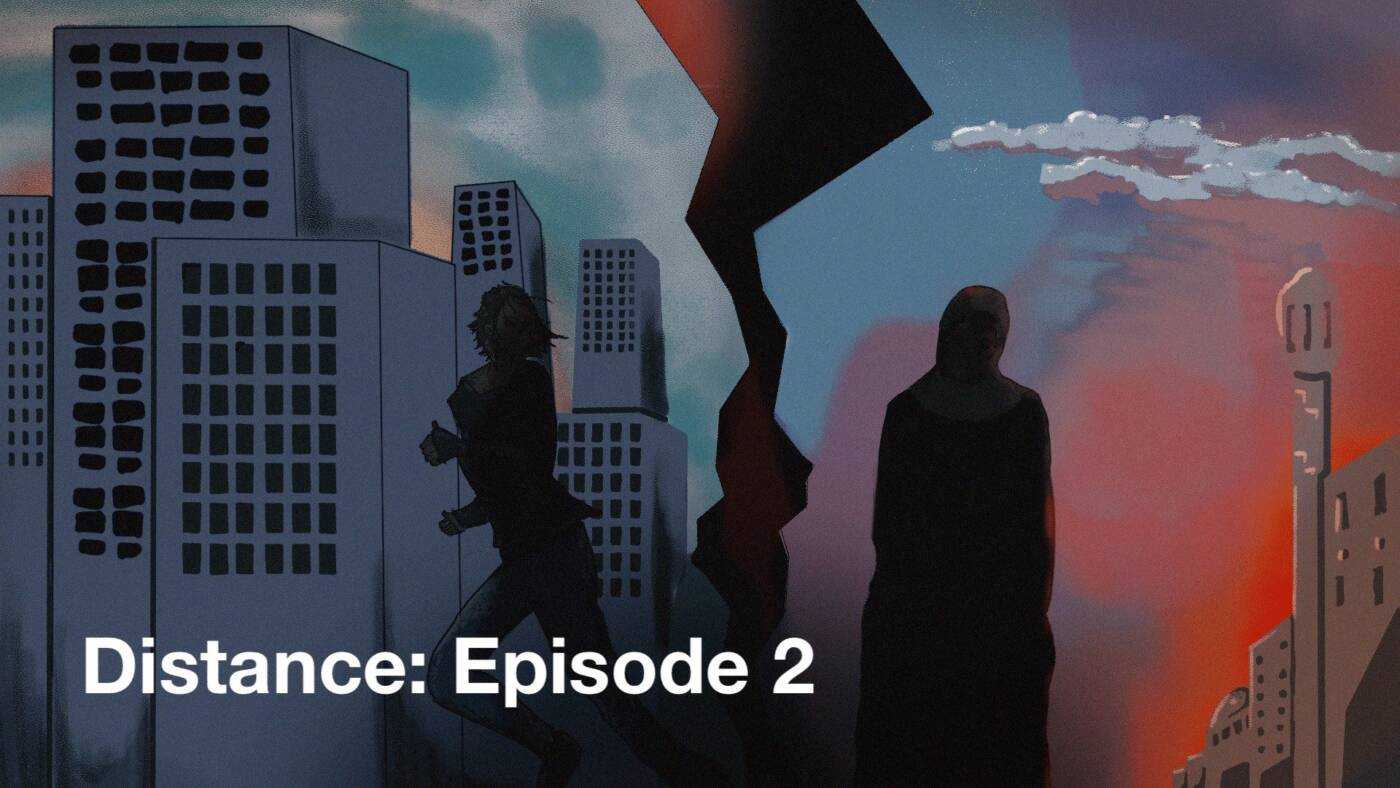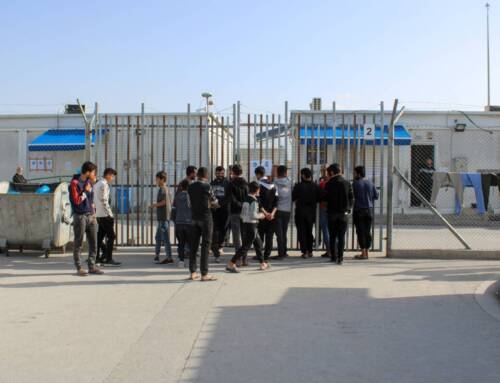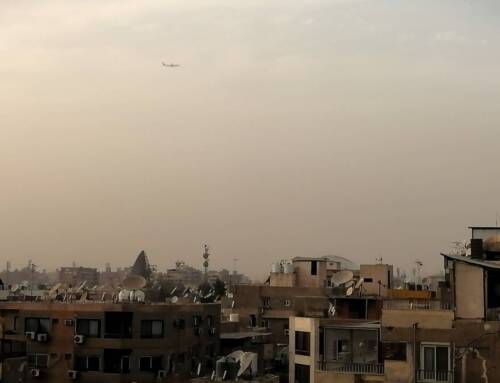Distance (Episode 2): Alone in Germany
Alaa fled to Germany at 16, after her brother was disappeared by Syrian government forces. She hoped to bring her parents later, but her reunification request was denied. She has not seen her parents for seven years, and has never met her six-year-old brother.
23 January 2023
Length: 19 minutes
In 2015, 16-year-old Alaa escaped Syria and fled to Germany. Her parents, Fatima and Essam—now in Chtoura, Lebanon—fled Syria later, and hoped to join her through family reunification.
But bureaucracy and delays stood in the way. Alaa’s application was rejected because, by the time the court ruled on her request, she was already 18, and had subsidiary protection, not refugee status. Alaa, now 23, has not seen her parents in seven years, and has never met her six-year-old brother, Hamoudeh.
This is the second episode of “Distance,” the second season of Syria Direct’s podcast “Qayd.” This series tells the story of Syrians who reached safety in Europe and applied for family reunification, but fell through the cracks of asylum rules. It is also about those they left behind.
This podcast was produced by Alicia Medina and edited by Mateo Nelson, with illustrations by Rami Khoury, and a soundtrack by Eli Ishac and Carol Abi Ghanem. It was narrated by Alicia Medina, with dubbing in English by Samer Dada, Ola Muchref and Banan Hamou. This series was produced with financial support from the European Endowment for Democracy (EED).
All episodes of “Distance” will be available on SoundCloud, Spotify and Google Podcasts.
TRANSCRIPT:
(MUSIC, LAUGHTER)
FATIMA: Hey, Alaa, how are you? What’s new? Are you at your aunt’s house?
ALAA: Yes! Show me somebody, I can only see the door.
FATIMA: Your dad and Hamoudeh are at the mosque.
ALAA: Oh, they went to the mosque today.
ALICIA MEDINA (HOST): A video call. That’s the only way Alaa and her mother Fatima have seen each other in the last seven years. Alaa lives in Germany. Her parents are in Lebanon.
When Alaa was 16, she fled Syria for Germany, hoping her parents could join her later, through family reunification. But a bureaucratic nightmare stood in the way.
FATIMA: Ok, and any news on family reunification?
ALAA: Not yet, I asked the person at the Red Cross…
(MUSIC)
MEDINA: This is the second episode of “Distance,” a podcast by Syria Direct. This series explores how Syrian families have navigated years of separation after they received asylum or another protection status, but were denied family reunification.
What happens when the plans of a mother to unite with her children, or a wife with her husband, never materialize? What happens to those who get left behind?
This is a story of those who fall through the cracks of European asylum systems.
(MUSIC)
MEDINA: As Fatima hangs up on Alaa, she looks at her own WhatsApp profile picture for a moment. It’s a photo of her son Mahmoud. He was 19 when he was detained and forcibly disappeared by Syrian security forces. His father, Essam, remembers that fateful day. It was New Year’s Eve in 2012. They were working together at a print shop in Damascus.
ESSAM: There were a couple of protests in our town. They came to the print shop and took him. Until now we don’t know what happened to him, if he’s alive or dead. My son was so special.
MEDINA: Mahmoud became one of the 132,000 people detained and missing during the Syrian conflict. Most of them—87,000—were forcibly disappeared by the Syrian regime.
Besides Mahmoud, Alaa has two sisters who fled to Jordan with their families in 2013. And she has a little brother, Hamoudeh, who she has never met. He was born a few months after she fled Syria.
The family asked to be identified by their first names only, for security reasons.
(MUSIC)
MEDINA: In 2011, when the Syrian uprising broke out, Alaa was 12. Soon after, in 2013, they fled their village in the Damascus countryside due to clashes between the Syrian army and armed opposition groups.
ALAA: The shelling, the bombing, even when I left my village I could still hear the sounds of war around me, the shelling, the guns. It was all war and destruction. It was difficult.
MEDINA: In January 2014, Alaa and her mother Fatima witnessed how Syrian regime forces detained and tortured two of Alaa’s uncles, who, like Mahmoud, are still missing.
FATIMA: He was choking my brother with a thick chain on his neck. I reached out and asked him to let him go, for the love of God. The head of the unit said ‘leave him, now I’m going to drag him around town, for everyone to see’. And he did it, he dragged my brother. He tied him to the back of his car, and dragged him around town. My brother’s face was red, like blood.
MEDINA: They took her younger brother from his house. He was let go the next day, but detained again the following year.
FATIMA: The seven of them stomped on him with their feet.
MEDINA: On one occasion, Alaa’s father, Essam, was also threatened with detention.
ESSAM: They wanted to take me to the security branch. When you go to the branch, nobody knows what happens. Nobody knows your fate. We have a neighbor, they came for his son and he said ‘I’m going with him.’ They’re both still missing.
MEDINA: By 2015, almost 190,000 civilians had been killed in the war. Alaa’s aunt, the wife of her uncle who was dragged behind a car, decided to flee to Germany with her seven children. Alaa’s parents couldn’t see a safe future in Syria. Essam’s salary wasn’t enough to cover their expenses. So they decided Alaa would go to Germany with her aunt.
ALAA: It was very difficult. You feel like this could be the last time you see your family. You hug your mom, your dad. That’s not like speaking on the phone. I miss them so much.
MEDINA: Alaa left in September 2015. The family was working class, and didn’t have the 3,500 euros needed to cover her journey, so they borrowed it.
Alaa, her aunt and cousins crossed to Lebanon and took a flight to Turkey. From there, they set off in a tiny boat. Alaa was 16.
ALAA: I was so scared. It was the first time I was away from my parents, on my own. I was used to having them around, so it was terrifying. I didn’t know how to swim, so I was about to go on a boat in the sea, and if we sank, I couldn’t help myself.
MEDINA: That year, 800 people died trying to make the same crossing.
ALAA: We went on a small boat, it was for five people but we were maybe 50. We were on top of each other, but thank god we reached a Greek island.
FATIMA: She crossed the sea, that’s no small thing. My heart was pounding until she reached Greece. I got the message, ‘thank God I arrived in Greece’. She went through a lot. I suffered for her, but my daughter went through a lot of pain, more than us. Sometimes when we talk, she cries.
MEDINA: Fifteen days later, Alaa and her aunt reached Germany, after passing through Serbia, Macedonia, Bulgaria, Croatia and Austria.
Back in Syria, shortly after Alaa left, security officers started blackmailing her parents. Two of Essam’s brothers had fled Syria, one was wanted for conscription in the army, and the other was an army defector. And with a daughter recently fleeing the country, and a son disappeared, the family was under suspicion.
FATIMA: My husband’s brother had a refrigerated truck. They said they would take it. They blackmailed my husband, and the first time he gave them 400,000 pounds.
ESSAM: They kept blackmailing me, asking for more money. I said ‘okay, how much do you want?’ He said 250,000. And he was like, ‘why did your daughter go to Germany? You’re helping people migrate.’ It was blackmail.
MEDINA: In October 2015, Essam and Fatima—who was four months pregnant—fled to Lebanon, where their youngest son, Hamoudeh, was born. Today, Essam works as a building concierge.
(MUSIC)
MEDINA: Alaa’s family history, with multiple family members forcibly disappeared, seemed like a strong case for asylum. So when Alaa reached Germany, she felt safe. For the first two months, she stayed at a football stadium with her aunt and cousins, then they moved into a flat.
But she was about to enter a labyrinth of paperwork.
(MUSIC)
MEDINA: Alaa was 16 and only spoke Arabic when she first met with German migration officers.
ALAA: I showed them my passport, I told them I am here, I am a minor, I want to apply for family reunification. All this was through a translator of course, because I didn’t speak English or German, just Arabic.
MEDINA: She told them about how her brother and uncles were detained. The wait began.
ALAA: They forgot me. The German state forgot about me, my aunt forgot that I was there, and that I had to do family reunification paperwork. I went to the town council, I told them I want a court date to do family reunification. I was 17, and I still didn’t have any document proving I was a refugee in Germany.
MEDINA: The German state assigned her a supervisor to help her deal with the paperwork, go to the doctor, and enroll in school.
ALAA: I tried to ask my supervisor, ‘What’s going on with my residency permit? What are these delays? Why is my court date taking so long? Why am I not going to court?’ There was no reply.
MEDINA: In 2016, Alaa got a temporary one-year residency, which she could extend. She was given subsidiary protection, not asylum, which would have given her more rights.
Germany is one of 15 European countries where those who obtain subsidiary protection have limited rights to reunification.
Alaa’s aunt got a three year residency permit. But Alaa, a minor without her parents, only got a one-year permit. She should have appealed while she was still a minor, but she didn’t know about that.
ALAA: It’s not just me, I know a lot of people who faced these difficulties, where German authorities were late in processing their residency permit, and they turned 18. Then it’s like, ‘you’re 18 and you’re responsible for yourself, you don’t need your family.’
MEDINA: After turning 18, she tried to appeal, but it was too late.
ALAA: When I first got to Germany, I should have applied immediately for family reunification, and stated that I applied for it before I was 18. But nobody informed me about that.
FATIMA: She was 16, how is she going to do the papers if she doesn’t know a thing about Germany? She didn’t know the language, she was very stressed.
MEDINA: The rejection was devastating.
ALAA: When I got the decision in the mail, I collapsed. I started crying a lot. I didn’t tell my family at first, until I accepted the situation and I…it was a very hard time. I felt alone in a foreign country. I couldn’t see my family anymore.
MEDINA: She had gone from being a child who was doted upon, to being alone in Germany.
ALAA: When I lived with my family, they were there for anything I needed: to go to the doctor, to go to school. My mom and dad were always supporting me, they would always help me. When I came to Germany, all that changed.
Here, I’m on my own. I faced difficulties on my own. I had to go to the doctor, to school on my own. When I came home, mom and dad weren’t there. My personality changed; I became someone else.
FATIMA: She was a teenager, she needed me. Her aunt can’t give her the care I’d give her as her mom. I’d be there for anything. A daughter needs her mom of course, especially in the teenage years. She needs to talk about what she is going through, about her problems, to ask for advice. My daughter was deprived of this.
MEDINA: Holidays were especially difficult. Alaa found her thoughts drifting to happier times back in Syria.
ALAA: From the first day of Eid, in the early morning, your mother, father, siblings are there. Here, it’s true that my aunt is here, but it’s not like having my mom or dad. Eid was very difficult for me without them. Even now that I’m older, these days are very sad for me.
MEDINA: In 2022, Alaa graduated from high school. But her joy was overshadowed by her family’s absence.
ALAA: When I graduated from the Baccalaureate—it was very difficult. All my friends went with their parents and their siblings, and I had nobody. Some friends and my aunt came, but it’s not the same as having your sister or your parents, so it was very difficult.
MEDINA: Alaa has never hugged her five-year-old brother Hamoudeh, who lives with their parents in Lebanon.
FATIMA: She has seen photos, and they talk through video. At first, he didn’t want me to talk to them. He’d say no, thinking me and Dad are just for him.
MEDINA: Alaa is now 23. She has a close relationship with her mother, who still worries about her.
One day Alaa told her she would go to a party. And Fatima lost it when Alaa didn’t respond to her calls.
FATIMA: For a moment she didn’t reply, the day she went out with her friends. My heart was pounding. She didn’t reply! It was out of service. I called my nieces, did you see Alaa? Where’s Alaa? What did they do to her? She isn’t responding…oh God… and then she called and was like, ‘Mom I was in the bathroom’. I told her ‘I thought you went with this new friend and something happened to you.’ She started laughing.
MEDINA: With absences comes nostalgia. Alaa’s most precious memories are the calm moments with her parents at home in Syria.
ALAA: I would sit with my mom and talk about the future, and play cards with her and my dad. Those are sweet memories. When my dad came back from work, we’d sit and play cards. And we’d all eat at the same table.
MEDINA: Essam loved spoiling her.
ESSAM: I would always buy her stuff, she would tell me, take me out, we would go once a week. She was the little one, the spoiled one, she’d always say ‘take me there, pick me up,’ I would take her to the print shop, to play, to the park, and buy her food.
MEDINA: For Fatima, happiness was just sitting and playing cards.
FATIMA: Alaa, her dad and I would play shaddeh all night, laughing. You brought me back to winter memories. We used to play basra.
MEDINA: The family has been through a lot. But they are still hopeful they can find a way to reunite.
FATIMA: It’s no small thing for a girl to leave her family. I hope they reunite us soon. If not family reunification, just let us travel via the UN, so we can be with our children, so we can be a family, together again.
MEDINA: Alaa has applied for German citizenship. If she gets it, she could sponsor her parents and get them a visa, after providing proof that she has enough savings to support them, which so far she does not have.
This year, she applied to university to study business administration. She didn’t get in, and will apply again.
ALAA: Since I was little, I always dreamed of having –I don’t know, maybe you’ll laugh at me—but I dreamed I’d have a little coffee shop that I would design and manage, a small business where I’m the boss.
MEDINA: Alaa is building a life in Germany. But for her, Syria will always be home, although she knows she will likely never return and live there.
ALAA: Syria is home. I was born there, I grew up there. It’s possible I won’t go back and live there, but I hope I can have a house there to go back and visit. My future is in Germany, I studied in Germany, I live in Germany, my life is here. But Syria is my homeland, my mother, everything.
MEDINA: For Fatima and Essam, too, returning to Syria is not an option.
FATIMA: How could I go back? Where would I go back to? My son is detained. My house is gone. I don’t want to return. How could I go back to my house, to my town, without my family?
ESSAM: I don’t feel Syria is home anymore, because the situation is really bad. I don’t want to live in Lebanon or Syria. Hopefully we can leave, and see our daughter in Germany. Even if not Germany, any European country, I wish.
MEDINA: After almost a decade of displacement, they still don’t feel at home in Lebanon.
FATIMA: We go to bed dreaming of traveling, and we wake up hoping to travel. Abu Mahmoud won’t let me fix up the house. He says, are we settling down here? Okay, let me put up curtains, I have no mattresses like everyone else. Let me fix it. He’s like, ‘no, we are not settling down here.’
MEDINA: For now, video calls help Alaa and her parents come together as a family, reaching across the 3,000 kilometers that separate them. The days of staying up late to play cards are, for now, just a memory.
On one side of the screen, Alaa sits in her flat in Germany, no longer the teenager who left home and crossed a sea. And on the other side, her parents and brother wait, in a house without curtains, for the chance to join her.







